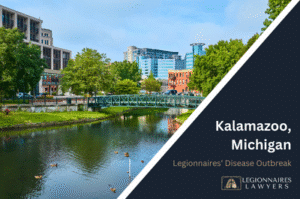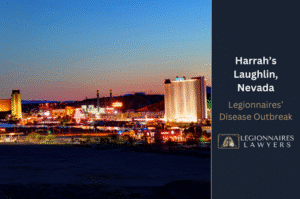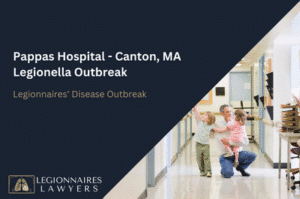When a Legionnaires’ disease outbreak occurs, prompt and coordinated action is essential to protect public health and ensure accountability.
As specialized attorneys in Legionella-related litigation, we guide individuals and families through the complexities of outbreak investigations, public health responses, and potential legal actions.
You May Have a Case. We’re Here to Help.
Free ConsultationLegionella Outbreak Investigation
An outbreak is typically defined as two or more confirmed cases of Legionnaires’ disease in a specific location. Investigations involve:
- Patient Interviews: Collecting detailed exposure histories to identify potential sources.
- Environmental Sampling: Testing water systems, cooling towers, and other potential reservoirs for Legionella bacteria.
- Laboratory Analysis: Confirming the presence of Legionella species and determining their strain.
These steps are crucial in pinpointing the source and preventing further cases.
You May Have a Case. We’re Here to Help.
Free ConsultationPublic Health Response to Legionnaires’ Disease
Upon identifying an outbreak, public health authorities implement measures to control the spread:
- Issuing Warnings: Notifying the public and at-risk individuals.
- Implementing Control Measures: Such as restricting water use or installing point-of-use filters
- Monitoring and Surveillance: Tracking new cases and the effectiveness of interventions.
These actions are vital to mitigate the impact and protect community health.
Legionella Control Measures
Keeping Legionella in check calls for a thoughtful, proactive approach. Key control measures include:
- Water Management Programs: Establishing protocols for routine maintenance and monitoring.
- Disinfection Techniques: Using chlorine, copper-silver ionization, or thermal treatments to eliminate Legionella.
System Design Improvements: Modifying water systems to prevent conditions conducive to Legionella growth.
Implementing these measures is essential in preventing outbreaks and ensuring safe water systems.
You May Have a Case. We’re Here to Help.
Free ConsultationLegionnaires’ Disease Surveillance
Ongoing surveillance isn’t just a technical requirement—it’s a frontline defense. It plays a vital role in:
- Early Detection: Identifying clusters of cases promptly.
Data Collection: Gathering information on incidence rates and demographics. - Trend Analysis: Monitoring patterns to inform public health strategies.
A strong surveillance system doesn’t just react, it helps stay one step ahead.
Legionella Risk Assessment
Regular risk assessments involve:
- Identifying Hazards: Pinpointing areas where Legionella can proliferate.
- Evaluating Risks: Assessing the likelihood of exposure and potential consequences.
- Implementing Controls: Establishing measures to mitigate identified risks.
These assessments are crucial for maintaining safe environments, especially in healthcare and hospitality settings.
You May Have a Case. We’re Here to Help.
Free ConsultationLegionella Environmental Sampling
When it comes to tracking down Legionella, environmental sampling is a critical step, and how you do it matters. Common techniques include:
- Water Sampling: Collecting samples from faucets, showers, and cooling towers.
- Biofilm Analysis: Examining surfaces where bacteria may harbor.
- Air Sampling: Detecting aerosolized Legionella in the environment.
Proper sampling is essential for accurate detection and source identification.
Legionnaires’ Disease Reporting Requirements
Healthcare providers are mandated to report confirmed cases to local or state health departments. Timely reporting facilitates:
- Outbreak Detection: Identifying and responding to clusters of cases.
- Resource Allocation: Ensuring appropriate public health interventions.
- Legal Accountability: Holding responsible parties accountable for negligence.
Adherence to reporting requirements is vital for public health and legal processes.
You May Have a Case. We’re Here to Help.
Free ConsultationPublic Health Regulations for Legionella
Regulations include:
- Mandatory Reporting: Ensuring all cases are documented and investigated.
- Safety Standards: Establishing guidelines for water system maintenance and disinfection.
- Enforcement Mechanisms: Imposing penalties for non-compliance to protect public health.
Understanding and compliance with these regulations are crucial for preventing outbreaks and ensuring accountability.
How We Can Help
If you or a loved one has been affected by a Legionnaires’ disease outbreak, our experienced legal team can assist by:
- Investigating the Incident: Determining the source and extent of exposure.
- Assessing Liability: Identifying responsible parties and potential legal claims.
- Seeking Compensation: Pursuing claims for medical expenses, pain and suffering, and other damages.
You May Have a Case. We’re Here to Help.
Free Consultation





